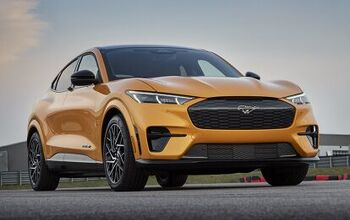If U.S. Auto Sales Were Growing Like Canadian Auto Sales, Americans Would Buy 18.5 Million Vehicles In 2017
In concert with the American auto industry, Canada’s auto industry reported an all-time record year of sales in 2016.
The difference? In Canada, 2016 represented the fourth consecutive year of record sales. Another difference? Canadian auto sales just kept on growing throughout 2017. Most recently, that streak of increases included an 8-percent year-over-year uptick in September 2017. Sales last month were 16-percent stronger than they typically are in September.
Month after month after month, Canada’s auto industry just keeps on smashing records. It’s as if the U.S. auto industry posted its banner year of 17.5 million sales in 2016 and then bettered that with 18.5 million sales in 2017.
Through the first three-quarters of 2017, Canadian auto sales rose nearly 6 percent, a gain of some 84,000 units for an industry that now averages nearly 180,000 monthly sales. So far this year, Honda, Chevrolet, GMC, Ram, Volkswagen, Subaru, Mercedes-Benz, Audi, Lexus, Cadillac, and Infiniti, among other lower-volume brands, have all reported double-digit percentage gains. Rare is the brand that’s losing sales: Hyundai, Dodge, and Jeep are the only high-volume brands to do so.
Pickup trucks now own more than one-fifth of the market. Passenger cars are losing market share, but the degree to which they’re losing sales has slowed. Cars are down just 2 percent this year. Not only is the Honda Civic on track for its 20th consecutive year of Canadian sales leadership, Civic sales are on track to break 2008’s all-time Civic record. Booming SUV/crossover sales are at the center of the market’s growth, of course, as top sellers such as the Toyota RAV4, Honda CR-V, and Nissan Rogue are all ahead of last year’s record pace.
Incentives naturally play a part in the industry’s steady move toward the first-ever year of 2 million+ sales. So too does leasing and long-term loans. Leases account for over a quarter of Canadian auto sales, according to J.D. Power. The average loan term is now 75 months, about six months longer than the average term south of the border. Meanwhile, nearly a third of loan customers are rolling negative equity into their next purchase.
Is this a recipe for continued growth in the Canadian auto industry? If past is prologue, Canadian auto sales are destined to rise further.
Auto BrandSept. 2017Sept. 2016% Change2017 YTD2016 YTD% ChangeFord30,09329,2902.7%239,629232,3623.1%Toyota19,59917,05614.9%156,611153,0752.3%Honda16,14315,6093.4%139,843126,91210.2%Chevrolet15,69314,7176.6%132,185113,32916.6%Nissan12,21510,67914.4%104,78895,6639.5%Hyundai11,96111,6622.6%103,232112,292-8.1%GMC8,6297,80710.5%76,10463,29420.2%Ram8,1366,98716.4%85,08874,08814.8%Kia7,8196,54819.4%59,75156,0816.5%Volkswagen7,5645,02650.5%52,78547,67610.7%Mazda6,8766,01314.4%57,01052,7598.1%Dodge5,4195,989-9.5%60,07365,509-8.3%Subaru5,1394,61111.5%40,97637,24810.0%Mercedes-Benz4,7274,18812.9%39,53035,27512.1%Jeep4,0315,600-28.0%54,38265,070-16.4%BMW3,7093,5863.4%28,53228,2291.1%Audi3,2772,73919.6%27,95223,40119.4%Lexus2,4192,17711.1%18,68716,47113.5%Mitsubishi2,0691,9376.8%17,48717,1312.1%Acura2,0381,9882.5%14,73614,913-1.2%Buick1,6381,678-2.4%14,09514,096-0.0%Cadillac1,2771,2641.0%10,1828,75116.4%Infiniti1,2221,07613.6%9,5368,64810.3%Land Rover89579912.0%6,8966,8650.5%Lincoln788861-8.5%6,4766,3841.4%Porsche76066015.2%6,1245,39013.6%Mini70060815.1%5,1885,0642.4%Chrysler597893-33.1%10,86313,114-17.2%Volvo55045321.4%4,9334,7284.3%Jaguar43833132.3%3,6552,04378.9%Fiat152169-10.1%2,1931,80621.4%Alfa Romeo109110,800%53471652%Maserati725824.1%973391149%Genesis50——378——Smart33400-91.8%2771,335-79.3%Bentley1523-34.8%1519460.6%———————Ford Motor Company30,88130,1512.4%246,105238,7463.1%General Motors27,23725,4667.0%232,566199,47016.6%Toyota Motor Corp.22,01819,23314.5%175,298169,5463.4%Hyundai-Kia Automotive Group19,83018,2108.9%163,361168,373-3.0%Fiat Chrysler Automobiles18,51619,697-6.0%214,106220,049-2.7%Honda Canada18,18117,5973.3%154,579141,8259.0%Nissan/Infiniti/Mitsubishi15,50613,69213.2%131,811121,4428.5%Volkswagen Group11,6168,44837.5%87,01276,56113.7%Mercedes-Benz Canada4,7604,5883.7%39,80736,6108.7%BMW Group4,4094,1945.1%33,72033,2931.3%Jaguar Land Rover1,3331,13018.0%10,5518,90818.4%Total †187,266173,7817.8%1,595,5191,511,8365.5%Source: Global Automakers of Canada
† total includes Automotive News estimates for Tesla (350 September sales; 3,150 YTD) and low-volume brands that do not report monthly sales.
[Image: Audi]
More by Timothy Cain
Latest Car Reviews
Read moreLatest Product Reviews
Read moreRecent Comments
- Alan Where's Earnest? TX? NM? AR? Must be a new Tesla plant the Earnest plant.
- Alan Change will occur and a sloppy transition to a more environmentally friendly society will occur. There will be plenty of screaming and kicking in the process.I don't know why certain individuals keep on touting that what is put forward will occur. It's all talk and BS, but the transition will occur eventually.This conversation is no different to union demands, does the union always get what they want, or a portion of their demands? Green ideas will be put forward to discuss and debate and an outcome will be had.Hydrogen is the only logical form of renewable energy to power transport in the future. Why? Like oil the materials to manufacture batteries is limited.
- Alan As the established auto manufacturers become better at producing EVs I think Tesla will lay off more workers.In 2019 Tesla held 81% of the US EV market. 2023 it has dwindled to 54% of the US market. If this trend continues Tesla will definitely downsize more.There is one thing that the established auto manufacturers do better than Tesla. That is generate new models. Tesla seems unable to refresh its lineup quick enough against competition. Sort of like why did Sears go broke? Sears was the mail order king, one would think it would of been easier to transition to online sales. Sears couldn't adapt to on line shopping competitively, so Amazon killed it.
- Alan I wonder if China has Great Wall condos?
- Alan This is one Toyota that I thought was attractive and stylish since I was a teenager. I don't like how the muffler is positioned.


































Comments
Join the conversation
It pains me that my countrymen have, for 20 long years, defied everything good that has hit the auto market and kept on schlepping around in vanilla boring Civics (except special high performance models of course). Get on the freeway in the morning and you think you are in a Honda dealer's sales lot. It has been boring now for two decades. Sometime, surely, it's going to stop. Here's a test: from 25 feet tell me the year and model of your Civic. Hah. I knew you couldn't. Fellow Canadians, for pete's sake, buy something anything else.
Oh, to make it easier. Canadians own far less vehicles per capita, hence greater scope for sales.